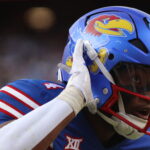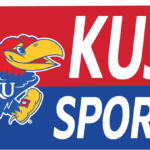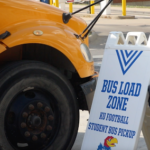The University of Kansas football team welcomed Jalon Daniels back to the starting quarterback position after injuries left him benched in the past two seasons.
Mily Favella | @MilyFavellaTV
Daniels made his debut for the first game of the season against Lindenwood University at Children’s Mercy Park.
Considering Daniels was out for the past two seasons, he performed well against Lindenwood and completed nine out of 15 attempted passes, throwing for one touchdown and one interception.
Unfortunately, Daniels did not perform as well in KU’s next game against the University of Illinois. Daniels completed 18 out of 32 attempted passes, throwing for two touchdowns and three interceptions. Both Daniels and Jeff Grimes, offensive coordinator for KU football, faced backlash for the poor offensive performance showcased against the Fighting Illini.
Fans took to X, formerly known as Twitter, to express their frustrations with Daniels and Grimes.




Images taken from @KU_Football on X
Daniels’ performance against Lindenwood was his since Sept. 2023, and the junior QB played in only 14 out of 28 games over the past two seasons.
Possible lingering mental impact
Darrell Phillips, an adjunct sports psychology professor at KU, has been studying the impacts of sport-related injuries for over 30 years and knows the struggles that athletes face when battling an injury.
Phillips notes that sports-related injuries are a complex web of factors, but stress is a common component. He describes stress as when an individual doesn’t think they can handle or fulfill their perceived demands successfully.
“Whether you’re on the football field, basketball court, volleyball … whatever it is … if you get in a situation where you don’t think you can quite do this perfectly that has the potential, its not always, but the potential to lead to body tension and misreading cues,” Phillips said.
Phillips says that it’s important to channel the energy people receive from stress into something more efficient.
“What we try to do is to teach athletes, and people in general, to lean into that stress … to find something in there that you think is causing stress and, uh, start to view it as a resource so that instead of being anxious, I’m excited. Instead of having nervous energy, I’m going to use this energy to focus on my skills, to do them better and perform them better,” Phillips said.
Phillips said that any injury, but especially sport-related injuries, requires a great deal of physical rehabilitation and mental nurturing to ensure that the transition back to the field is as seamless as possible. He also said that it is not uncommon for an athlete to be cleared physically but still struggle mentally, especially with confidence.
This battle with confidence can lead to clouded judgment when an athlete has to make a split-second decision in a high-pressure situation, like whether to run or pass the ball.
Phillips also said that it is crucial for a recovering athlete to have strong communication with their rehab team, which can include the trainers, medical doctor, coach, teammates, family and friends. Phillips believes that the support system within an athlete’s rehabilitation team – trainers, medical doctors, coach, teammates, family, and friends – is crucial for an athlete to be successful and comfortable throughout the rehabilitation process and the transfer back to sport.
“Obviously step one is to go watch the film … I think he’s going to find that you know obviously he made mistakes, I made mistakes, the entire offense made mistakes, so you know, just continue to remind him who he is, you know? We all know how talented he is, how gifted he is and the more he remembers that the more he can get back into his groove,” Devin Neal, KU’s running back, said in a post-game interview regarding Daniels’ performance in Illinois.






